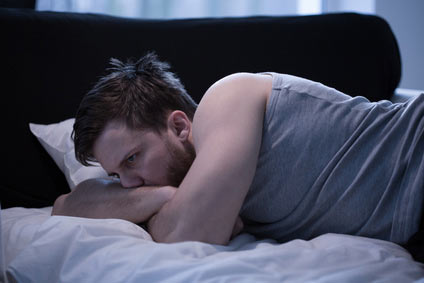Sleep Apnea and Depression
How to cope with sleep apnea and depression?

Scientists have no doubt that sleep apnea and depression are linked together.
Just knowing you have a deadly sleep disorder that can't be controlled so easily without a proper treatment, can make you feel depressed.
In this article you'll learn why patients with sleep apnea can also have depression, and what can you do if you have depression.
Why People with Sleep Apnea have Depression?
Psychological causes of depression in sleep apnea patients
People with sleep apnea tend to become social isolated from their partners and children because of their fatigue and sleepiness.
They will tend to stay less with their family and relationships and to spend more time sleeping.
Family or friends can be more like a burden, rather than a source of support.
Sleep apnea can deeply affect your quality of life. From your inactivity in family's social life to negative attitude throughout the day, all this will affect your home and social life.
These problems may contribute to marital conflict and divorce.
In this video, Dr. Barry Freydberg explains how sleep deprivation resulted from sleep apnea can affect your quality of life:
Depression After Successful Sleep Apnea Treatment
Believe it or not, depression can appear when sleep apnea is successfully treated. But why a person would become depressed after successful therapy?
This type of depression can happen when a person experience a big change in his life in a very short time, from sleepy and lonely to awake and active.
Former sleep apnea patients may be pushed too fast into the active life, and he may feel strange about how to deal with this changes.
Another common reason to be depressed after a successful sleep apnea treatment is when you realize that you have lost many good years of your life in a state of somnolence.
It this situation is better to allow you some time to grieve before you can let go of those years and get on with your life.
Symptoms of Depression in Patients with Sleep Apnea
- pessimism
- fatigue
- decreased energy
- loss of interest
- poor sexual functioning
- poor self-esteem
How to Cope with Sleep Apnea and Depression?
Depression symptoms can disappear if you start a successful sleep apnea treatment. However, depending of the severity of your sleep disorder, these depression symptoms may not vanish from the beginning of your treatment.
For example, if you have a severe case of sleep apnea, you have a lot of sleep dept to recover until you'll feel treated.
The ideal case to avoid depression when you already have sleep apnea, is to start the treatment in the early stage of development. Unfortunately, not many people realize they have a sleep problem on this stage.
The following video explains why CPAP therapy is critical for improving your depression, if you already have sleep apnea:
Get your Family Involved
Family support is very important for you, when you have sleep apnea and depression.
The severity and duration of the person's depression depends on family support and on the individual. And you need lot's of positive thoughts to continue sleep apnea therapy.
Bottom line... Please remember that your are not alone in having problems with sleep apnea and depression.
It may help to talk with others who have been through similar experiences. Try to attend to group meetings and forums to find people who were in the same situation.
Home › Sleep Disorders › Congestive Heart Failure Treatment







